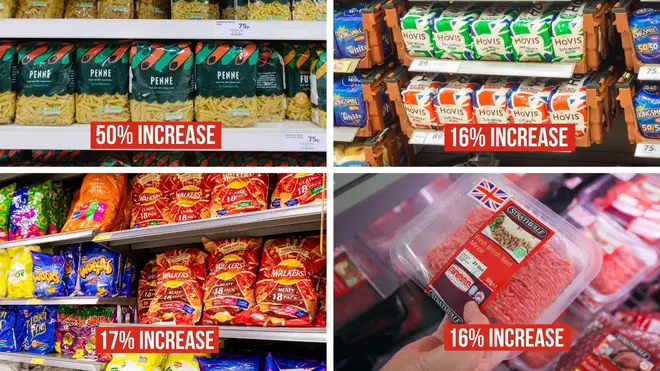
Clive Bull 1am - 4am
30 May 2022, 13:25

The surge in supermarket food prices over the last year has been revealed as households grapple with runaway inflation.
The latest Office for National Statistics (ONS) statistics show the cheapest food items on supermarket shelves have soared in price between April last year and April this year.
The cheapest pasta in the UK jumped in cost by a shocking 50% during that time.
READ MORE: Shop prices rise at highest rate in more than a decade
READ MORE: Inflation at highest level in 30 years as cost of living soars
It comes as experts warn the poorest households in the country are bearing the brunt of the cost of living crisis.
Statisticians chose 30 everyday items they know the least well-off households regularly buy to get an idea of how inflation is hitting these households.
They trained algorithms to select the cheapest possible alternatives on the websites of Asda, the Co-op, Iceland, Morrisons, Sainsbury's, Tesco and Waitrose, and tracked its price over the year.
Despite Aldi and Lidl being among the cheapest supermarkets in the country they were not included as they do not allow customers to shop online.
The data found pasta prices rose at the fastest rate, followed by crisps (17%), bread (16%), minced beef (16%) and rice (15%).

The UK's high inflation will not last 'very long'
Falls were seen in the price of potatoes (14%), cheese (7%), pizza (4%), chips (3%), sausages (3%) and apples (1%).
While inflation hit a 40-year high of 9% in April as measured by the Consumer Prices Index, those who are least well off spend a larger proportion of their income on the basics, such as energy bills.
As a result, the Institute for Fiscal Studies has suggested that inflation for the poorest households ran at 10.9% in the year to April.
The latest ONS analysis indicates that, at least for the 30 items it chose, inflation for the cheapest alternatives has been running similar to overall food and alcohol prices, increasing by between 6% and 7%.
However, it does not take into account the costs associated with buying a product. For instance, potato prices have dropped significantly over the last year, but many struggling households avoid potatoes, because they take longer to boil than alternatives and therefore use more expensive gas.

Cost of living crisis: James O'Brien speaks to Lord O'Neill
In March, the boss of Iceland said that some food bank users were turning down potatoes and other root vegetables because they could not afford to boil them.
The ONS acknowledged that the research it has done is "highly experimental".
It warned that because the analysis only focuses on the lowest-priced goods the estimates are based on a very small number of price quotes. This means the data is very sensitive to changes in just one item.
It also does not mitigate the concerns of food campaigner Jack Monroe who has criticised supermarkets for allegedly limiting access to their cheapest products in store.
"The available products represent the retailer's online catalogue, rather than the range of products available or bought in local stores that month," the ONS said.